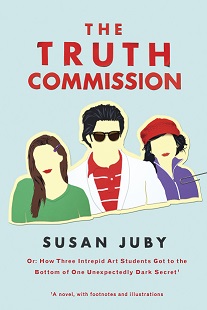| ________________
CM . . .
. Volume 21 Number 20 . . . . January 30, 2015
excerpt:
Norm (Normandy) is in Grade 11 at the Green Pastures Academy of Art and Applied Design when she and her best friends, Dusk and Neil, decide that life would be considerably easier if everyone simply always told the truth. The three decide to form the Truth Commission in order to ask various classmates about rumors which surround them. If everyone knows the truth, then rumors and gossip will just disappear. Simple, right? Juby poses interesting questions for her young adult readers about the fine line between wanting the truth and intruding on the privacy of those around us. She also illustrates how easy it seems to be to ask others to bare their souls and tell the truth while doing the same oneself can be difficult, if not impossible. Norm has little desire to look into her family and uncover the truths which are hidden there. Her older sister, Keira, has created a series of graphic novels which depict the family in very unflattering ways. Now Keira has left college and returned home although most of her time is spent elsewhere. No one in the family knows where she is nor what she is doing, and her parents feel they must give her artistic licence to continue her writing. Only at the very end of the novel does Norm find the courage to confront her sister’s behaviour and attempt to learn the truth behind her leaving college and making accusations against one of her teachers. Norm, Dusk and Neil are a trio whom readers will enjoy as each brings a different personality to the Truth Commission. Dusk can be tough and sharp while Neil is more like a calm negotiator. Norm joins the group with some hesitation and is the last of the three to attempt interviewing someone in order to learn the truth about them. Juby’s setting of an Arts Academy allows her to add a supporting cast of strange and wonderful secondary characters whose behaviour often goes beyond what would be expected and accepted in another setting. While adding interest, colour and sometimes humour to the novel, the characters seem rather stereotyped and, therefore, less believable as real people. Norm’s parents are also difficult to comprehend. Despite being made fun of and seemingly rejected by their older daughter, they have nothing but praise for her and explain any unusual or thoughtless behaviour as her artistic temperament. She lies to them and thinks nothing of disappointing them, yet they firmly keep their heads in the sand about her behaviour. Norm’s attempts to discover the truth about her sister and to enlighten her parents are seen as merely a bad case of sibling rivalry. The parents are cast as dysfunctional would-be artists who apparently have little grasp of, or interest in, reality, with no redeeming qualities to make them more believable. The novel is written as a creative nonfiction assignment by Norm, and so the reader has good insights into her personality and both her hesitation and motivation to be a part of the Truth Commission. There are times when she realizes that the truth is necessary and others when Norm understands that uncovering secrets can be dangerous and without any real merit. Learning this distinction provides both some of the humour as well as some of the poignancy of the novel. Because Juby has chosen the vehicle of a class assignment for this novel, there are 118 footnotes in the text. Occasionally they act as true footnotes, explaining a quote or giving context to something in the text. More often, they are asides in which Norm adds a personal opinion to what has been written. In general, they are disruptive and take away from the fabric of the story. Perhaps intended to add humour, they are merely distracting and aggravating, making the entire novel seem self-absorbed and turning readers’ attention away from the challenging theme. Both Juby and Norm come across as trying too hard in their writing. Some of her extraordinarily artsy characters seem weak and unrealistic, and the continual footnotes detract from the story rather than adding to it. However, thematically, Juby has presented an excellent young adult novel which probes the need for truth versus the comfort of keeping personal issues personal and, when necessary, using defensible little white lies. Recommended.
Ann Ketcheson, a retired teacher-librarian and high school teacher of English and French, lives in Ottawa, ON.
To comment on this title or this review, send mail to cm@umanitoba.ca.
Copyright © the Manitoba Library Association. Reproduction for personal use is permitted only if this copyright notice is maintained. Any
other reproduction is prohibited without permission.
CM Home |
Next Review |
(Table of Contents for This Issue - January 30, 2015.)
| Back Issues | Search | CM Archive
| Profiles Archive |
